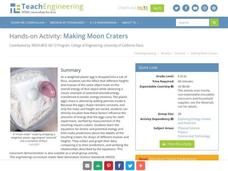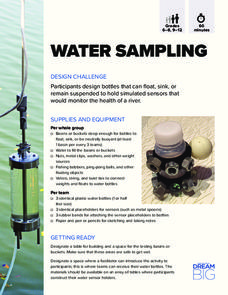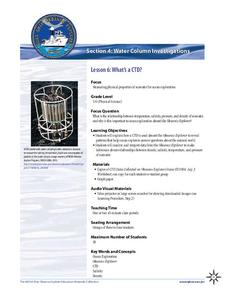Teach Engineering
Air Under Pressure
Introduce your class to air masses and how they affect the weather with a lesson plan that focuses on the differences between high and low air pressure systems. The class explores actual weather data using archived weather data.
Teach Engineering
Water Remediation Lab
Water filtration — that's pure genius! Groups test the ability of a water filter to purify water by running chlorine contaminated water through a filter and measuring the chlorine concentrations as they filter the water. They then graph...
DiscoverE
Air-Powered Mini Rocket
Does the position of the clips make a difference? The activity provides directions to build and test a paper rocket. Pupils attach paper clips to the rocket in different configurations and measure the distance the rocket flies each time....
Teach Engineering
Making Moon Craters
Create an egg-citing study of energy. Pupils investigate the effect of height and mass on the overall amount of energy of a falling object. The fourth segment in a six-part series on energy uses a weighted egg falling from different...
Teach Engineering
How Big? Necessary Area and Volume for Shelter
Teams must determine the size of cavern needed to house the citizens of Alabraska to protect them from the asteroid impact. Using scaling properties, teams first determining the number of people that could sleep in a classroom and then...
Teach Engineering
Edible Rovers
The good thing about building this rover is you get to eat it afterwards. Pairs determine rover parts they want to include in their design based upon their cost and usefulness. The teams design their rovers, build them from edible...
Teach Engineering
Preconditioning Balloons: Viscoelastic Biomedical Experiments
What does stretching a balloon have to do with equilibrium? Groups explore preconditioning by stretching a balloon to a point of equilibrium. They then measure the amount of force required to stretch the balloon to the same point several...
Beyond Benign
Ecological Footprint
How does your lifestyle measure up in terms of your ecological footprint? Young ecologists examine their impact on the planet using an insightful online calculator. A short quiz asks users to rank the size of their homes, their energy...
Teach Engineering
Better By Design
Which modification is the best? Using the scientific method, pairs determine the effects of each control surface on the distance of a glider's flight. The activity, section 16 in a 22-part unit on aviation, allows pupils to gain a better...
Teach Engineering
Can You Take the Pressure?
Do not let the pressure get to you. The first lesson in a unit of 22 introduces the concept of air pressure. Using background knowledge, the resource gives teachers the information they need to discuss how people measure air pressure and...
Teach Engineering
Stormy Skies
Young meteorologists examine the four main types of weather fronts and how they appear on a weather map. Participants learn about the difference between the types of weather fronts along with their distinguishing features. A...
Teach Engineering
Ice, Ice, PV!
Knowing the temperature coefficient allows for the calculation of voltage output at any temperature. Groups conduct an experiment to determine the effects of temperature on the power output of a solar panel. The teams alter the...
Teach Engineering
An Inflated Impression of Mars
Help your class understand the magnitude of the distance between Earth and Mars with an activity that asks small groups to use balloons to create scale models of the Earth, Moon, and Mars. Class members figure out the distances between...
Teach Engineering
Designing a Spectroscopy Mission
In this mind-bending activity, young engineers explore this question of whether or not light actually bends. Using holographic diffraction gratings, groups design and build a spectrograph. The groups then move on research a problem...
Exploratorium
Salty Pits
Yuck, does my deodorant kill that? To test whether deodorant is anti-bacterial, class members use petri dishes to grow control bacteria and bacteria from sweat, and then compare them to see if deodorant effects the growth.
DiscoverE
Sun-Warmed Treats
Treat your class to a fun activity, complete with treats. Groups create a solar oven from a pizza box. They then use it to heat up some food ... that's what an oven is for, after all!
Teach Engineering
Insulation Materials Investigation
Don't melt away! Pairs investigate different insulation materials to determine which one is better than the others. Using a low-temp heat plate, the teams insulate an ice cube from the heat source with a variety of substances. They...
Exploratorium
Oil Spot Photometer
Are these two light sources the same? Groups use a white card and a little cooking oil to create a photometer that allows for the comparison of two lights. The Inverse Square Law provides a way to calculate the actual difference in...
Teach Engineering
Red Cabbage Chemistry
Using the natural pH indicator of red cabbage juice, groups determine the pH of different everyday liquids. As they work, pupils gain an understanding of pH that may help deal with contaminants in the water supply.
DiscoverE
Water Sampling
What is the best way to test water quality? Using plastic bottles, scholars create monitoring sensors to test water quality. Creating three different sensors allows individuals to measure water quality at different water levels.
DiscoverE
Solar-Heated Water
Heat up some interest in solar energy. Young engineers create a water heater that runs on solar power (simulated by a lamp). Using thermometers, they determine the change in temperature before and after the water goes through the heater.
DiscoverE
Make a Light Bulb
Could you reinvent the light bulb? Scholars tap into their inner Thomas Edisons to build a light bulb prototype out of a jar and some wires. They see how long the filament wire glows in the jar (batteries not included) to measure their...
NASA
Write the Book on Weather Metrics
It's not easy to measure the weather. Pupils learn about what all weather has in common—the atmosphere. Scholars discover how a meteorologists must be able to measure aspects of the atmosphere and decipher the data. They then create a...
NOAA
What's a CTD?
Why are the properties of the water important when exploring the ocean? Young scientists discover the tools and technology used in deep sea exploration in the fourth installment in a five-part series. Groups work together to examine...

























